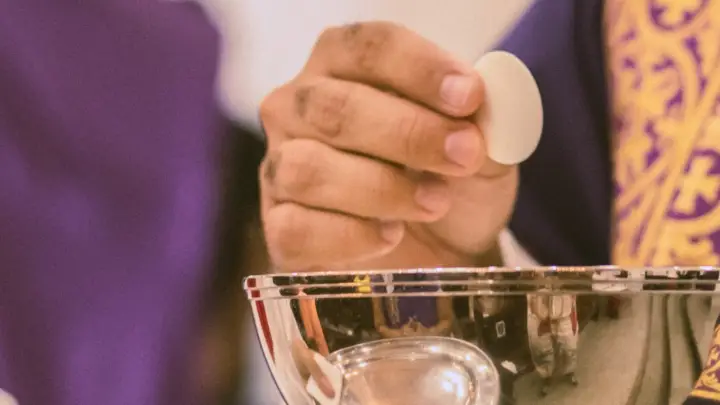“Why would I receive Communion? I have a mortal sin.” This is what I usually heard around when my relatives and I would go to Church. As a child, I actually didn’t quite get it. The more I asked questions about it, the more I got confused. It is when I went back to the Catholic faith, that I totally understood it. In this blog post, we will tackle if it is really a sin to receive Communion without going to confession.
What is the Eucharist?
Before we deep dive into our main topic, let us begin first with what the Holy Eucharist is.
According to the Catechism of the Catholic Church,
CCC 1324 The Eucharist is “the source and summit of the Christian life.” “The other sacraments, and indeed all ecclesiastical ministries and works of the apostolate, are bound up with the Eucharist and are oriented toward it. For in the blessed Eucharist is contained the whole spiritual good of the Church, namely Christ himself, our Pasch.”
It is also known as the Holy Communion or the Holy Mass.
CCC 1331 Holy Communion, because by this sacrament we unite ourselves to Christ, who makes us sharers in his Body and Blood to form a single body. We also call it: the holy things (ta hagia; sancta) – the first meaning of the phrase “communion of saints” in the Apostles’ Creed – the bread of angels, bread from heaven, medicine of immortality, viaticum. . . .
CCC 1332 Holy Mass (Missa), because the liturgy in which the mystery of salvation is accomplished concludes with the sending forth (missio) of the faithful, so that they may fulfill God’s will in their daily lives.
In the Holy Eucharist, the bread and wine are transubstantiated into the real Body and Blood of our Lord Jesus as He said in the following bible verses.
Then he took the bread, said the blessing, broke it, and gave it to them, saying, “This is my body, which will be given for you; do this in memory of me.” And likewise the cup after they had eaten, saying, “This cup is the new covenant in my blood, which will be shed for you.
Receiving Communion without Confession
Holy Eucharist is the Sacrament of Sacraments. It is through which God offered Himself to us. That said, there are instances that one should refrain from receiving Him as follows.
CCC 1457 According to the Church’s command, “after having attained the age of discretion, each of the faithful is bound by an obligation faithfully to confess serious sins at least once a year.” Anyone who is aware of having committed a mortal sin must not receive Holy Communion, even if he experiences deep contrition, without having first received sacramental absolution, unless he has a grave reason for receiving Communion and there is no possibility of going to confession. Children must go to the sacrament of Penance before receiving Holy Communion for the first time.
What happens if you receive Communion without confession?
According to the Code of Canon Law,
CIC 916 A person who is conscious of grave sin is not to celebrate Mass or receive the body of the Lord without previous sacramental confession unless there is a grave reason and there is no opportunity to confess; in this case the person is to remember the obligation to make an act of perfect contrition which includes the resolution of confessing as soon as possible.
Blasphemy
Now, let’s answer the question.
Is it a Sin to Receive Communion without Confession?
Yes. Receiving Communion without confession is a grave sin. It is blasphemy. Accepting Christ unworthily is sacrilegious. One must go to confession first and receive absolution before receiving Communion.
Therefore whoever eats the bread or drinks the cup of the Lord unworthily will have to answer for the body and blood of the Lord.
Mortal Sin
The Catholic Church categorizes sins depending on their gravity.
It could be mortal or venial.
These are the conditions for a sin to be mortal.
- It is of grave matter
- Committed with full knowledge
- Committed with deliberate consent
Let’s use receiving the Eucharist in mortal sin as an example.
If one received Communion without going to a confession despite awareness that it is a sin, then there is a mortal sin.
To elaborate.
First, receiving the Eucharist not in a state of grace is blasphemy, therefore, it is a grave matter.
Next, the person committed it in full knowledge. Meaning there was a consciousness that it is a sin.
Lastly, committed it with full consent. Despite knowing it was sinful, the person still deliberately committed it.
Note that all conditions must be present. If a sin lacks one of these conditions, it will fall as venial.
Mortal sins should be confessed. While confessing venial sins is advisable.
Confession
As mentioned, blasphemy is a grave sin and therefore must be confessed.
Confessing blasphemy is simple and straightforward.
To confess, you just have to tell the priest your sin. In this case, receiving Communion without confession.
You can then continue by mentioning the times you fell for this sin.
The priest will then give you counsel, ask you for penance and finally absolve you.
If it is your first time on confession, here is a beginner’s guide.
Or if you are struggling with scrupulosity, you check this Confession Guide.
Conclusion
Eucharist is a powerful Sacrament. When we receive Him, we unite with Him. And this is humbling and a sublime gift.
As Catholics, accepting Him must be our constant goal. Although hard sometimes, we must always present ourselves before Him free from the stain of sins, in a state of grace.
The Sacrament of Confession is always available for us, we must go there as needed, often. There, a bountiful of mercy is poured on us.
To summarize everything above, let’s leave everyone a reminder: Confession before Communion.
That we may understand the value of worshipping God together in the Eucharist, Loving Mother, pray for us.

